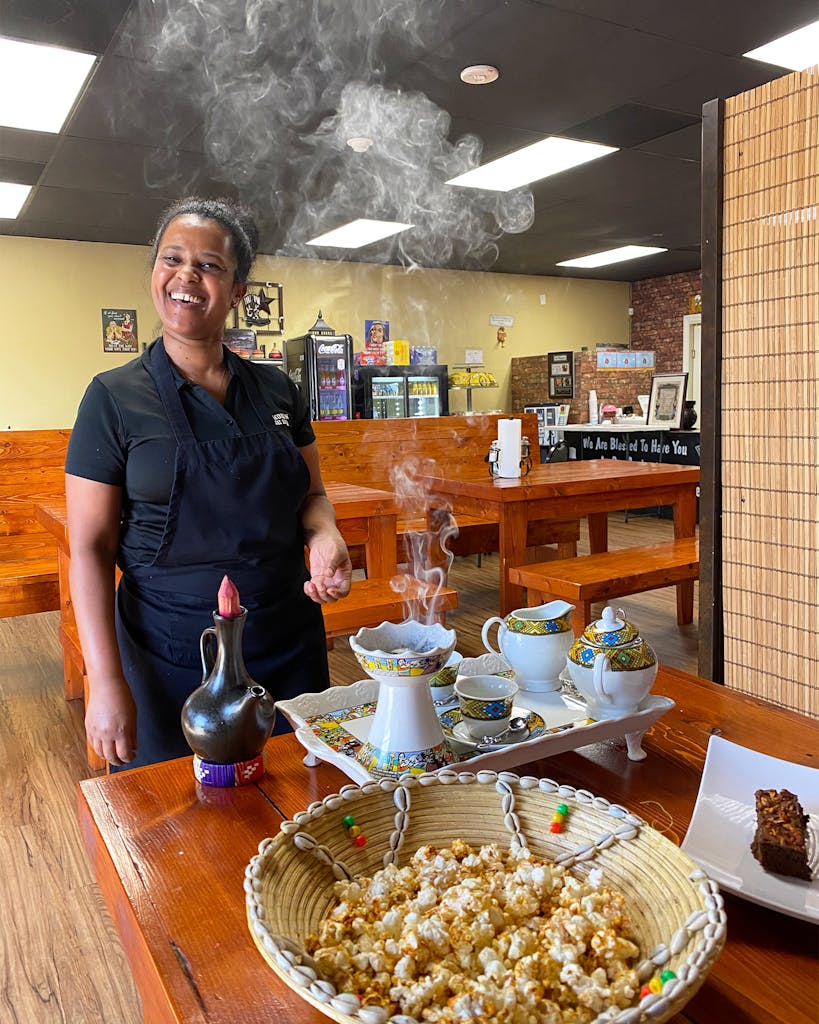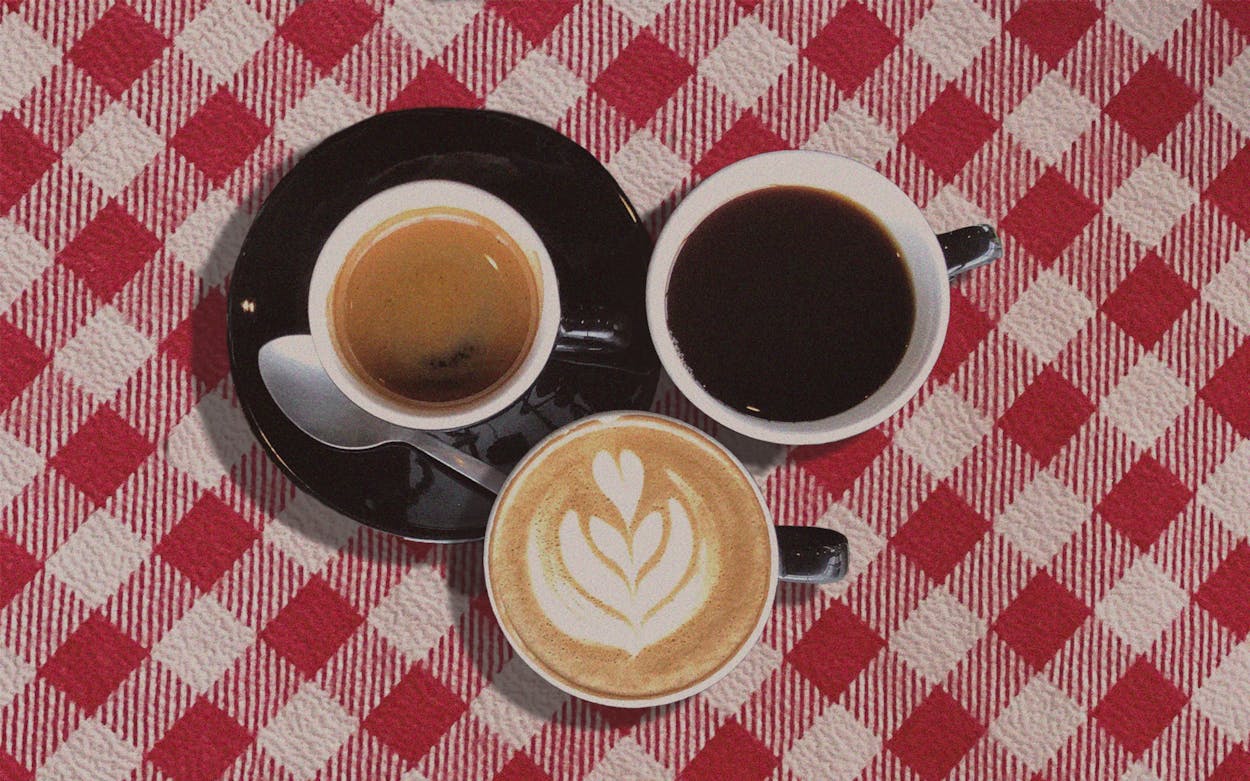As the owner and pitmaster of Harlem Road Texas BBQ in Richmond, Ara Malekian is obviously well-known for his barbecue. But he’s gaining notoriety for his signature Armenian coffee too. “At the barbecue events, I do end up spending more time making coffee than smoking meat,” Malekian told me. At last month’s Houston Barbecue Festival, I enjoyed a small cup of the dark, strong brew straight from the copper pot, or jazzve, Malekian travels with. It was a much-needed caffeine boost of a kind that used to be customary for any public barbecue in Texas.
Community barbecues were particularly popular from the late nineteenth century to the mid-twentieth century. Their menus varied widely when it came to meats and side dishes, based on what the surrounding farmers, ranchers, cooks, and bakers could provide. But coffee was listed on nearly every announcement I’ve seen from that time. In 1874, an editor for the Galveston Daily News, who evidently struggled with witty analogies, wrote, “A barbecue without pickles, coffee, sugar, and other shelf goods would be like the play of ‘Hamlet’ with Hamlet left out.”
A decade later, John Kohler’s market, one of the first meat markets to sell barbecue in Texas, ran an ad in the Bastrop Advertiser. The 1886 advertisement touted “Hot coffee, barbecue meats and sausage, at all hours.” The connection between coffee and barbecue was strong. Iced tea might be the brewed drink most associated with Texas barbecue these days, but coffee is making a comeback.
Mas Coffee sits at the corner of Brisket and Main Streets in Grand Prairie in a building that’s also home to Zavala’s Barbecue. Christan and Joe Zavala are co-owners of both endeavors, but Christan takes the lead on the coffee operation. The team begins each day at 4:30 a.m., using an Italian-made La Marzocco espresso machine for service that runs 6–11 a.m. Tuesday through Friday and 8 a.m.–noon on Saturday. With the barbecue joint opening at 11 a.m. Thursday through Sunday, Saturday is the only day you can order Mas Coffee and Zavala’s Barbecue at the same time, but you can get a barbecue breakfast taco any morning from Mas Coffee.
The shop offers drip coffee and cold brew, but most of the drinks start with a double shot—or two ounces—of espresso. Christan said a freshly pulled espresso degrades quickly—much like a slice of smoked brisket—and should be consumed as quickly as possible to retain the flavor. The shop gets its beans from Avoca Coffee Roasters in Fort Worth, and uses the Mogwai blend for nearly everything it serves, as the medium-roast blend of Central American beans is a crowd pleaser. The drink menu at Mas Coffee may sound confusing, so Christan helped break it down.
All of the coffee drinks (except the drip and the cold brew) begin with a double shot of espresso. Add two ounces of steamed milk, and you get a cortado. A cappuccino has six ounces of steamed milk and foam, and a latte has ten ounces of milk. Lattes can be sweetened and/or flavored. Two ounces of espresso are poured into eight ounces of hot water for an Americano, which is like a lighter version of brewed coffee. Basically, the more milk you add, the more it masks the flavor of the espresso. Think of a flavored latte like a chopped brisket sandwich with pickles, onions, and barbecue sauce. I prefer a cortado any time of the day because the small amount of milk adds some sweetness without overpowering the coffee. For a real caffeine boost, Christan suggests the high-octane cold brew, which you can get with cold foam on top.
As I travel to new joints around the state, espresso machines are becoming more prevalent. Agape BBQ in Liberty Hill uses one left from the coffee shop its building once housed. Baristas make an excellent cortado at Henderson & Kane in Houston, and it goes well with the barbecue breakfast tacos or a bowl of chili con carne. Ice cream topped with espresso, called an affogato, is a popular dessert at Wright On Taco & BBQ in Harleton. The business just upgraded its espresso machine, and now offers a full line of coffee drinks. Hill Barbecue in Lubbock recently took over the Yellow House coffee shop, which operates as a coffee shop and cafe during the week and serves barbecue on weekends.
Miller’s Smokehouse in Belton serves an array of coffee beverages and has become one of my favorite stops along Interstate 35 for an afternoon dessert and espresso break. The joint has taken it a step further by roasting its own beans and selling them under the Muscovy Coffee Roasters label (we wrote about the company a few years back when it was called Penelope Coffee Co.), which currently offers six varieties of whole bean coffee.
In Austin, food trucks like LeRoy and Lewis Barbecue, Briscuits, and JNL Barbecue are parked next to coffee shops. There’s a spout for cold brew in the self-serve drink machine at the Pit Room in Houston. And we can’t forget to mention the many versions of espresso barbecue sauce at joints like Franklin Barbecue in Austin and Killen’s Barbecue in the Houston area. Heck, Slow Bone in Dallas gets a custom blend of beans from Noble Coyote Coffee Roasters to use in its brisket rub.

The most unique coffee service in Texas barbecue might be at Smoke’N Ash BBQ in Arlington. Fasicka and Patrick Hicks offer Ethiopian coffee by the cup, or you can opt for the well-priced ($10 for one person, or $20 for up to three people) coffee ceremony called buna bejebena. (“Buna” is coffee in the Amharic language, and “jebena” is the name for the traditional clay pot the coffee is prepared in and poured from.) It begins with Fasicka emerging from the kitchen with a smoking skillet, called a mankeshkesha, full of coffee beans. She holds the pan above the table, and wafts it around so the aroma of the beans hangs like incense. That’s the final step of roasting the beans, which she takes back to the kitchen to grind and prepare the coffee.
Fasicka said that in her native Ethiopia she would drink coffee like this after all three meals of the day. “Here I get it out of the way American style, early in the morning,” she said. I’ve had it several times after finishing a large tray of Ethiopian-infused Texas barbecue. Fasicka fills small cups with dark coffee poured from the jebena. She suggests you ignore the sugar served alongside and instead ask for a sprig of rue. The leafy herb adds a hint of citrus flavor to the coffee, and is supposed to tame the bitterness as well. (It should be noted that pregnant women should not consume rue.) Between sips, enjoy a handful of smoked popcorn seasoned with berbere spice.
If you’re near Houston, stop in at Harlem Road Texas BBQ, where you’ll find Malekian when he’s not serving barbecue and coffee at a festival. His specialty Armenian coffee isn’t on the menu, but he’ll make one if you ask. It starts with coffee so finely ground it resembles cocoa powder. Katz Coffee, which roasts beans for Malekian, had to buy a new grinder just to get it fine enough. Malekian said the roast for Armenian coffee is lighter than that for Turkish, which makes it less acidic. It takes only a few minutes to brew, and it’s served in a demitasse cup about the size of a double espresso. Whole coffee beans, a drip grind, and the fine Armenian grind are all available for purchase at Harlem Road. You can even get a jazzve to make your own Armenian coffee, with the help of Malekian’s video instructions.
Next time you’re in a barbecue joint, look for a coffee option before ordering that iced tea. It’s an honored Texas tradition.








